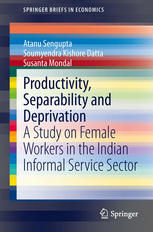

Most ebook files are in PDF format, so you can easily read them using various software such as Foxit Reader or directly on the Google Chrome browser.
Some ebook files are released by publishers in other formats such as .awz, .mobi, .epub, .fb2, etc. You may need to install specific software to read these formats on mobile/PC, such as Calibre.
Please read the tutorial at this link: https://ebookbell.com/faq
We offer FREE conversion to the popular formats you request; however, this may take some time. Therefore, right after payment, please email us, and we will try to provide the service as quickly as possible.
For some exceptional file formats or broken links (if any), please refrain from opening any disputes. Instead, email us first, and we will try to assist within a maximum of 6 hours.
EbookBell Team

4.8
94 reviewsIn production and service sectors we often come across situations where females remain largely overshadowed by males both in terms of wages and productivity. Men are generally assigned jobs that require more physical work while the ‘less’ strenuous job is allocated to the females. However, the gender dimension of labor process in the service sector in India has remained relatively unexplored. There are certain activities in the service sector where females are more suitable than males. The service sector activities are usually divided into OAE and Establishments. In this work, an attempt has been made to segregate the productivity of females compared to that of males on the basis of both partial and complete separability models. An estimate has also been made of the female labor supply function. The results present a downward trend for female participation both in Own Account Enterprises (OAE) and Establishment. The higher the female shadow wage the lower their supply. This lends support to the supposition that female labor participation is a type of distress supply rather than a positive indicator of women’s empowerment. Analysis of the National Sample Service Organization data indicates that in all the sectors women are generally paid less than men. A micro-econometric study reveals that even in firms that employ solely female labor, incidence of full-time labor is deplorably poor. It is this feature that results in women workers’ lower earnings and their deprivation.